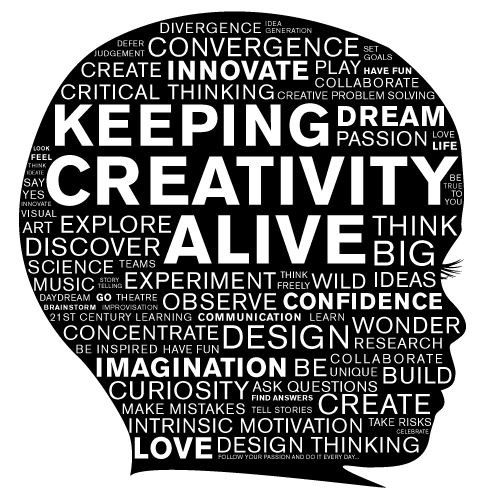 At One Life Success, we shape a vast majority of our posts towards creativity and all of these posts, in some way, encourage you to flourish in a creative sense.
At One Life Success, we shape a vast majority of our posts towards creativity and all of these posts, in some way, encourage you to flourish in a creative sense.
However, this post is a little different. Instead of providing you with a series of top tips to increase your creativity, this post provides you instead with a set of ‘what-not-to-do’ guidelines. Read on below for more.
Avoiding Creative Downfalls
1) Don’t… Pick A Job That You Hate
Work plays a significant role in your self-development and success because work takes up a large chunk of your greatest resource. Time. If you’re in the wrong role at work or simply not being paid enough for the work you do, this can often crush rather than support your creativity.
No matter how much an employer argues that they’re all for creative people and that they’re all for new ideas, companies are designed to maximise profit, not to maximise you and sometimes this can really kill our creative opportunities because if we feel like our ideas don’t matter and we learn not to make new ones. This work ethic is disastrous for our personal projects.
As a worker, I’d suggest that you consider your career options carefully before you choose. Work is important, sure, but make sure the job role suits you and that your strengths are being played too. As an employer, it’s your job to take this into consideration too. Surrounding your star worker with negative people, an ugly setting and a job they hate won’t help your business, you or them.
Sometimes you have to look at the bigger picture. And in the long run, if you give your best workers what they need to do their best work… it may take a little more time or money but you’ll make so much more in the end. Equally, it’s a good idea to carefully choose your employees.
Someone might seem like a great candidate because they have the perfect grades or work experience for it, but if they don’t suit the environment they won’t work well with others in it. Any section of our life that we dedicate time to is important. And this is well worth remembering if you want the best results.
2) Don’t… Over Plan For Your Success
Goals are important but restrictions? Not so much. This is another misconception for the ambitious. Some people think that devoting your life to a plan is a great idea and although I’m all for being organised, I disagree that it’s the only way to get things done. If you’re tied to a schedule, you won’t deviate from your plan. And if you don’t deviate from your plan, ever, you will be missing so many important opportunities and ideas.
 Creativity is about expressing your ideas. We all express different things in different ways, and thus, the best way to go about a goal is to set it, but then go about it in anyway that you feel would benefit you and the way you work.
Creativity is about expressing your ideas. We all express different things in different ways, and thus, the best way to go about a goal is to set it, but then go about it in anyway that you feel would benefit you and the way you work.
If working for a little bit every night isn’t your style, don’t try and suit that style just to get things done.
We are all different and often the best way to get something done creatively is to balance organisation with flexibility. If you’re turning down valuable opportunities to complete something off a to-do list you’re going at it from the wrong angle and quite frankly, shutting the door on creativity.
If you always think the same way, meet the same people, make the same mistakes you will never get any new ideas. Creativity is about taking risks and trying new things. If you are predictable as a person, your ideas will be predictable. If you’re petrified of mistakes, all people will have to say about you when you go is that you were a great speller.
And I know that you want more than that, but a routine can ruin the magic that creation brings. It makes creation a chore, something that you have to do rather than want to do. And that’s no way at all to lead your life.
3) Don’t… Stretch Yourself Too Thin
 Time and money are the main resources for creativity. So why do so many employers refuse to promote their workers or offer such short deadlines for the work they set? The best way to get a good, solid idea is to put time into that idea. Time in the form of thought, money and brainstorming.
Time and money are the main resources for creativity. So why do so many employers refuse to promote their workers or offer such short deadlines for the work they set? The best way to get a good, solid idea is to put time into that idea. Time in the form of thought, money and brainstorming.
Chances are, if you select the first idea that comes into your head, you won’t get the best results because it’s your first idea and you haven’t had a chance to branch off from that yet. Give yourself time to do the things that mean the most to you.
In order to grow, ideas need to be nurtured. Don’t be afraid to take a little longer than expected to get it right, to ask your boss for an extra day, or to give yourself an extra month to make that good idea a perfect one. As long as you started nice and early, you’ll save time in the long run. And you get out, what you put in after all.
4) Don’t… Stick Around Unsupportive People
If the people around you aren’t encouraging you or supporting you, then don’t hang around them. No criticism, except constructive criticism, did anyone any good. And the more you punish your ideas, the less likely you are to continue producing them. And that’s something a lot of creators and their bosses forget.
Collaboration is also key to successful creativity and putting like-minded people together often leads to your efforts paying off. But the whole ‘put the smiler with the frowner’ thing, never works either. That’ll just drag the ‘smiler’ down. So always think about what groups you join and what groups you put others in.
5) Don’t… Be Indecisive With Your Ideas
 Being confident about who you are and what you want to create is more important than you think. Indecisive people will never be able to push their ideas through because they can be easily moulded by the big voices around them.
Being confident about who you are and what you want to create is more important than you think. Indecisive people will never be able to push their ideas through because they can be easily moulded by the big voices around them.
So always be assured that your ideas are as good as everyone else’s and never be afraid to push them forwards. Too many employers assume that the quiet ones are quiet because they have nothing to say. This isn’t the case and quite often quiet people are the way they are because they have a lot to say, or too much to say and they’re not quite sure how the world will react to it.
So give the quiet ones a chance and if your quiet yourself, try you hardest to pitch your ideas to the ones you know will listen and don’t doubt them. Be assertive and believe in what you do.
6) Don’t… Follow the Rules too Closely
People who follow the rules don’t ask questions. And asking questions is a fundamental part of the creative process because if we don’t question the world around us, then we don’t understand what it’s missing or what we can provide for it that nobody else can.
To follow the rules is to follow the leader. And leaders are humans, they can be wrong too. Just because they’re experts in their field doesn’t mean they’re not still learning or that they can’t learn from you. To listen only to what they have to say and nobody else, is to avoid diversity, and to avoid following your instinct, is to pigeon hole your ideas.
Not everything useful can be filed away under a certain title. It’s a practical way to think but it’s not encouraging and it won’t get you to where you need to be. So once in a while, question the rules. Question what you are told, and think outside the box.
Conclusion to Creativity
Creativity is one of the most useful skills that anyone with big aspirations can have, and sometimes learning what not to do, is as important as learning what to do in terms of your big idea brainstorms. Hopefully you’ll come away from this post knowing how you can avoid the little mistakes that drag you down and believing that you can achieve amazing creations.
Wrote by Aimee Hall




